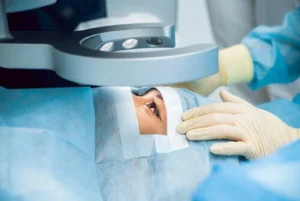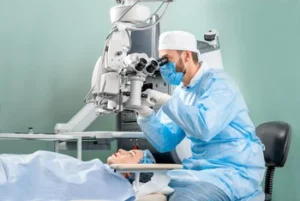People with hyperopia who prefer vision correction may consider laser eye surgery for long sightedness. Long-sightedness may make it easier to see distant objects clearly, while close objects may appear blurred or harder to focus on.
Laser eye surgery is a surgical eye procedure that requires consideration, professional assessment, and a clear understanding of its risks.
This article explains how laser eye surgery for long-sightedness works, the different types of laser vision correction, who may be suitable, and what to expect before and after the procedure. It also discusses alternative options and frequently asked questions to help you make an informed decision about your eye surgery choices.
 Understanding Long-Sightedness
Understanding Long-Sightedness
Long-sightedness (hyperopia) occurs when light rays enter the eye and focus behind the eye’s retina rather than on it. This happens because the eyeball may be shorter than normal or the cornea less curved.
As a result, distant objects often appear clearer than those close up. People may use reading glasses or contact lenses to help focus precisely on tasks that are near.
How Laser Eye Surgery Works
Laser eye surgery is a type of minimally invasive procedure that reshapes the corneal tissue to alter how light is focused within the eye. The goal is to help the eye focus images onto the retina. This process may reduce your reliance on wearing glasses and contact lenses for certain visual tasks.
During the laser eye surgery procedure, a surgeon uses lasers, such as an excimer laser or femtosecond laser, to modify the cornea’s shape. The laser beam removes layers of tissue, changing how light bends as it enters the eye.
Types of Laser Vision Correction
Several laser vision correction techniques can be used to address long-sightedness, depending on the eye’s anatomy and your refractive error.
LASIK (Laser-Assisted in Situ Keratomileusis)
LASIK involves making a flap in the cornea using a femtosecond laser. The eye specialist then uses an excimer laser to reshape the corneal tissue underneath before returning the flap to its original position. LASIK is chosen upon eligibility.
PRK (Photorefractive Keratectomy)
In PRK, no flap is created. Instead, the corneal epithelium (the thin outer layer) is removed before reshaping the cornea. The epithelium gradually regenerates after surgery. PRK may be for individuals with thinner corneas. However, each individual varies.
Suitability for Laser Eye Surgery
Not everyone with long-sightedness is a candidate for laser eye surgery. Factors that influence eligibility include:
- Age: The eyes should be fully developed, typically after 18 years old.
- Stable Vision: Your prescription should be stable for at least 12 months.
- Corneal Thickness: Adequate corneal tissue is required to perform reshaping.
- Overall Eye Health: The cornea, retina, and tear production should be healthy.
A thorough eye assessment helps determine if this surgical procedure is recommended.
 What to Expect During the Procedure
What to Expect During the Procedure
Before surgery, detailed cornea measurements and refractive error are taken to customise treatment. During the procedure:
- Anaesthetic eye drops numb the surface of your eye.
- The laser reshapes the corneal surface according to your prescription.
- The procedure for each eye is usually completed within minutes, though you may stay at the facility for longer overall.
Aftercare and Recovery
After laser eye surgery, the corneal tissue needs time to stabilise. Protective eyewear may be recommended, and follow-up appointments will be needed to monitor healing. Temporary blurred vision, mild dryness, or light sensitivity may occur during the recovery process.
It’s important to follow your eye professional’s guidance closely. Depending on the type of laser refractive surgery, people may return to daily activities after a few days, though outcomes vary between individuals.
Potential Considerations
As with any medical and surgical procedure, laser eye surgery carries some risks and limitations. These may include:
- Undercorrection or overcorrection, where further adjustment may be required.
- Temporary blurred vision or fluctuations as the eyes heal.
- Instances of infection or inflammation.
Discussing potential outcomes with your eye surgeon lets you decide whether laser eye surgery for long-sightedness may help address your refractive error.
Frequently Asked Questions
Can laser refractive surgery correct long-sightedness permanently?
Yes, laser refractive surgery can permanently correct long-sightedness (hyperopia) for many patients. The procedure reshapes the cornea to improve the way light focuses on the retina, helping you see clearly without glasses or contact lenses. However, it’s important to note that age-related changes, such as presbyopia, can affect near vision over time, and in some cases, a small enhancement procedure may be needed later.
Can I undergo laser eye surgery if I wear contact lenses?
Yes, but it’s recommended to stop wearing contact lenses for a certain period before the procedure. This helps surgeons take accurate corneal measurements.
What if I have both long-sightedness and astigmatism?
Depending on your eye condition, laser-assisted techniques can address multiple refractive errors, including astigmatism and hyperopia.
Conclusion

You can choose from your treatment options by understanding how light rays, the cornea, and the lens interact. A qualified eye surgeon can help assess whether this surgical procedure aligns with your visual goals and eye health.
To discuss your laser vision correction options or determine if you may be a candidate for laser eye surgery, contact Dr Anton Van Heerden at 03 9000 0389 to schedule a professional assessment.
Note: Any surgical or invasive procedure carries risks. Before proceeding, you should seek a second opinion from an appropriately qualified health practitioner.
References
Lipner, M. (2025, March 26). LASIK Eye Surgery: Factors to Consider. Verywell Health. Retrieved October 13, 2025, from https://www.verywellhealth.com/lasik-eye-surgery-7553679
WebMD Editorial Contributors. (2024, December 6). Hyperopia (Farsightedness). WebMD. Retrieved October 13, 2025, from https://www.webmd.com/eye-health/farsightedness



 Understanding Long-Sightedness
Understanding Long-Sightedness What to Expect During the Procedure
What to Expect During the Procedure



Recent Comments